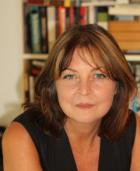Justin’s Japan: Interview with ‘Hiroshima in the Morning’ Author Rahna Reiko Rizzuto
By JQ magazine’s Justin Tedaldi (CIR Kobe-shi, 2001-02) for Examiner.com. Visit his NY Japanese Culture page here to subscribe for free alerts on newly published stories.
In June 2001, award-winning Japanese American author Rahna Reiko Rizzuto went to Hiroshima on a six-month fellowship to interview the hibakusha, or remaining survivors of the atomic bomb. Three months later, the September 11 attacks on the U.S. changed everything, from the recollections of the survivors to Rizzuto’s own relationship with her family back in America, including her husband and two young sons in New York.
The result was Hiroshima in the Morning, a memoir released last fall in which the author weaves these threads into a deeply personal story of awakening about how we choose our identities, how we view history, and how we use memory as a story we tell ourselves to explain who we are. I caught up with Rizzuto to discuss her emotional journey and impressions of Japan.
What was the most interesting thing about talking with the atomic bomb survivors in Hiroshima?
I went to Hiroshima initially because I knew so little—almost nothing—about the atomic bomb and its effects. I arrived more than 55 years after the bombing, so I expected memories to be a little hazy. When I first arrived, I met people who were very committed to telling their stories in the interest of peace. They wanted to testify about the power of the atomic bomb and the devastation of war in general in hopes that there would be no more war. That would make their sacrifices worth it.
I was there to write a novel, though, not a factual piece, so what I was looking for was textures and details about what it was like to live in those times, and how one survived war. So what I was getting was not exactly what I was looking for. Their stories were very complete and rehearsed. What happened then, though, was after three months of listening to these testimonies, the September 11th attacks happened within sight of my Brooklyn home. The world changed. And so did their stories.
In hindsight, how different did the interview project turn out because of 9/11?
I don’t think anyone can underestimate the effects of those attacks. They reverberated immediately, all the way to Japan, and we all suddenly felt the world was not safe. We were not safe. And if we weren’t safe, there was no peace, and if there was no peace, the hibakusha realized, then their sacrifice was for nothing.
Almost immediately, this destabilization affected their stories. They began to feel more, and to remember more. Moments and people they had blocked out came back to them. They remembered heat, and color and sound. And they remembered what it felt like to go back to their homes and find their mothers’ bones.
Which of the testimonials affected you the most? Why?
The most unbearable stories were often about children. Children who died; children who tried to save their brothers or parents; children who cremated their parents, at age six, because that was what their parents would have wanted. In the months after 9/11, though, something happened which was very moving and powerful. A number of people came to me to tell their stories. Before then, I had been finding my own interviewees with the help of my translators, but after September 11th, I found out that many people actually knew I was there, listening, and they sought me out because they needed a witness. They needed a safe place to relive, and purge, their memories. And then, it wasn’t just the sad moments. It was also the happy memories of life before, and their family members before. They needed to share those, too, and they gave them to me so their loved ones would not fade away.
Click here for the rest of the interview.



Comments are closed.